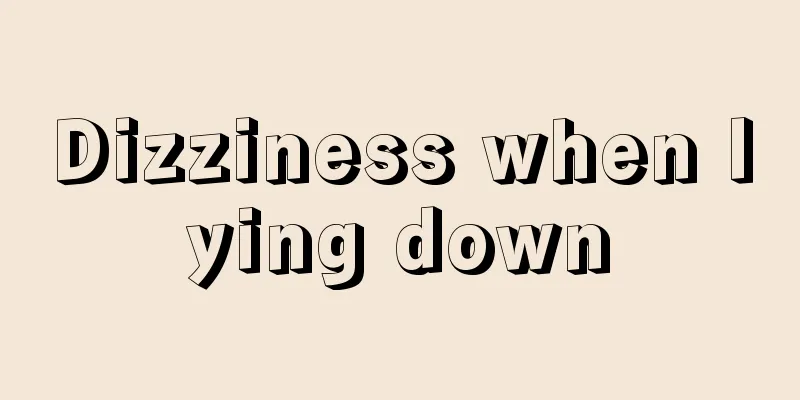Dizziness when lying down

|
The brain plays a very important role in the body. It can give people a sense of balance and prevent the body from standing unsteadily. Problems with the brain's sense of balance can lead to serious problems such as dizziness, adding a lot of difficulties to people's lives. There are many specific manifestations of dizziness. Among them, dizziness when lying down is the most common. Let’s take a look at why you feel dizzy when lying down. There are several types of dizziness. There are several possible causes for the symptoms. Vertigo can be divided into two categories: one is "ordinary dizziness" and the other is "recurrent vertigo" caused by problems with the balance system. Dr. Tang pointed out that many cases of dizziness are "common dizziness", which may be caused by a cold, infection, or high or low blood pressure. However, when these problems disappear, the dizziness will also subside. As for the condition generally described as "ear water imbalance", it is usually caused by problems with the balance system, resulting in a feeling of dizziness and seasickness. The causes include cervical spondylosis, and some dizziness is caused by poor balance of the brain. For example, Meniere's disease is a disease caused by enlargement or effusion of the inner ear lymph nodes. The patient will suddenly feel dizzy, which usually only lasts for a few tens of seconds. Functional hypoglycemia It can also cause dizziness, palpitations, weakness, tremors when on an empty stomach or when exerting force, sometimes convulsions, loss of consciousness, etc. When you are emotionally stressed or hyperventilating, respiratory alkali poisoning may occur due to increased carbon dioxide excretion, brain cell hypoxia, causing dizziness and fatigue. The patient may also feel numbness and coldness in the face, hands and feet, and occasionally a sense of trance. Vasoinhibitory dizziness It is often triggered by emotional tension, pain, fear, bleeding, hot weather, fatigue, cavity, insomnia, etc. Patients often experience autonomic nervous system dysfunction such as dizziness, vertigo, nausea, upper abdominal discomfort, pale complexion, cold sweats, etc. At that time, blood pressure dropped and pulse was weak. Vasoinhibitory dizziness is more common in frail young women. Orthostatic hypotension refers to symptoms such as dizziness, blurred vision, weak legs, vertigo, and even fainting when standing, often accompanied by anorexia and urinary and bowel disorders. |
<<: I suddenly feel dizzy. What's going on?
>>: Dizziness and eye discomfort
Recommend
Introduction to Pumpkin Vine's smoking cessation method
We all know that smoking is harmful to health, bu...
How to repair a broken sole in the middle
I find that everyone has such troubles in life. I...
One side of the ear is blocked
Many nerves inside the ear are closely related to...
What should you pay attention to when you have a dizziness and headache during self-massage
With the rapid development of society, many peopl...
How are tonsil stones formed
Tonsil stones are a disease that causes headaches...
What to do if facial allergy and peeling
Women pay close attention to their facial skin pr...
Diet recipes for ovarian cancer chemotherapy
When it comes to ovarian cancer, everyone is fami...
What to eat when you have lung cancer? Precautions for a reasonable diet for lung cancer
The incidence of lung cancer is getting higher an...
How to remove spots with ginkgo leaves?
Ginkgo leaf is a very common plant in daily life....
Can I brush my teeth on the day of filling?
If people have problems with falling out or missi...
Ways to control your emotions
The biggest difference between adults and childre...
Xuanyang Decoction plus Jiyin Decoction for the treatment of bladder cancer
Bladder cancer belongs to the category of "u...
Which is better, fixed denture or removable denture
With the continuous improvement of living standar...
How to provide good sleep quality
Only by eating well and sleeping well can you hav...
What are the dangers of prostate massagers?
Men still face some common diseases, but some pro...









